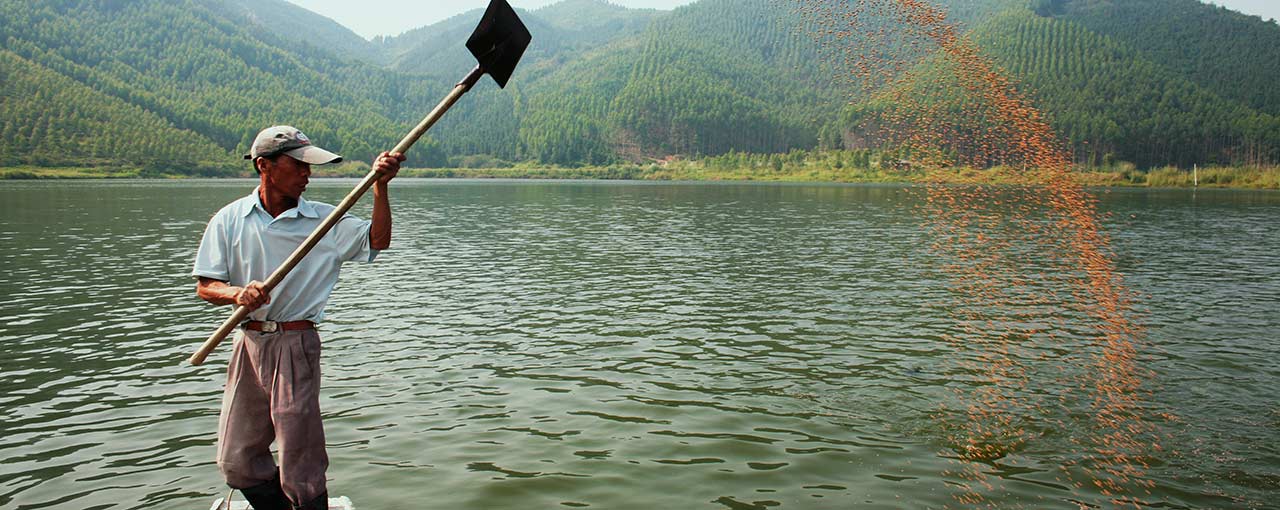Sustainable Aquaculture Feed & Ingredients
Conserving marine resources and maximizing productivity
We improve aquaculture sustainability by increasing the efficiency of feed production and conversion to reduce environmental impact and conserve natural resources. We help farmers to raise more fish and seafood while preserving marine resources for future food production.
Research and innovation
We invest in research to understand the health of farmed fish and seafood, then develop innovative feeds that keep them healthy and boost performance.
Resource conservation
We conserve marine resources and reduce our dependency on certain raw materials, including fishmeal and fish oil. Those ingredients are excellent sources of protein and other essential nutrients for aquaculture, but the supply of these resources is limited. Fishmeal and oil are derived primarily from small fish – such as anchovies, sardines and capelin – and from byproducts and trimmings from seafood caught for direct human consumption. Through extensive research and work with other Cargill business units, we identify and source alternative ingredients – including responsibly produced plant proteins and oils – that provide necessary nutrients. As a result, we have significantly decreased our use of fishmeal in aquaculture feeds while maintaining optimum growth performance and production. We continue to look for new sources of amino acids and other essential nutrients in co-products to replace fishmeal in aquaculture diets.
Balance
Our aquaculture feeds are made from a balanced mixture of fish- and plant-based raw materials, providing essential proteins, oils, vitamins and minerals while conserving finite marine resources.
Productivity & Feed conversion
We produce feeds that deliver a strong conversion ratio to efficiently transform nutrients into healthy food for people to enjoy.
Environmental impact
Cargill looks for ways to reduce the environmental impact of our own operations and across our supply chain. For example, in our salmon business, we analyze the carbon footprint of our feed products along the supply chain to identify opportunities for reducing our environmental impact. We continuously refine our environmental management systems based upon internationally recognized standards.
Marine raw materials
In our salmon feed business, for example, we have decreased our use of marine raw materials (sum of fish meal and fish oil) by half, from 55 percent in 2005 to 27 percent in 2015, despite a large increase in annual feed production over the same period.
Labor standards
Feed production contributes to activity and employment in local, often rural, communities. We have high safety and ethical standards for our employees and for all workers across our aquaculture supply chain.
Formulation
Fishmeal has long been the most important ingredient in commercial feed formulations, but fluctuations in price and availability makes it important for Cargill Aqua Nutrition to adapt a flexible and more rational use of marine proteins.
Cargill Aqua Nutrition has taken this search for alternative, sustainable raw materials seriously, and we run a continuous and extensive raw material evaluation program. Every year we put a large number of raw materials through a series of chemical, technical and biological tests, giving us important information on how to make tomorrow’s salmon feed.
The chemical and technical testing are done using rapid analysis methods in our own laboratories in Dirdal, Norway. Once we have the chemical and technical ‘fingerprint’ of a meal, the same raw material is used to make feed which is tested in growth trials with first feeding salmon. We have approximately 140 rearing tanks allocated for this work, and have capacity to evaluate more than 170 meals per year. In addition, the same raw materials are used in digestibility trials with salmon. This adds to our understanding of how the different chemical compositions of meals affect the fish metabolism, and how available the nutrients in each meal are to the fish.
By linking all this data in databases and models, we are developing a sound understanding of which parameters are needed in order to produce meals with high biological value. This program also maps out variation in quality between raw material types and between the different suppliers. This information is used for purchase and formulation purposes, and is shared with collaborators with the aim to develop new and improved raw materials. This way we will ensure that Cargill Aqua Nutrition has the flexibility needed in order to always deliver nutritionally optimized, sustainable feed, regardless of fluctuations in the raw material market.
Raw material selection
We use raw materials that are sustainably and responsibly sourced.
Sustainable soy
Aquaculture nutrition solutions
We provide sustainable solutions for farmers of salmon, tilapia, shrimp, carp, catfish and other species of fish and seafood.

